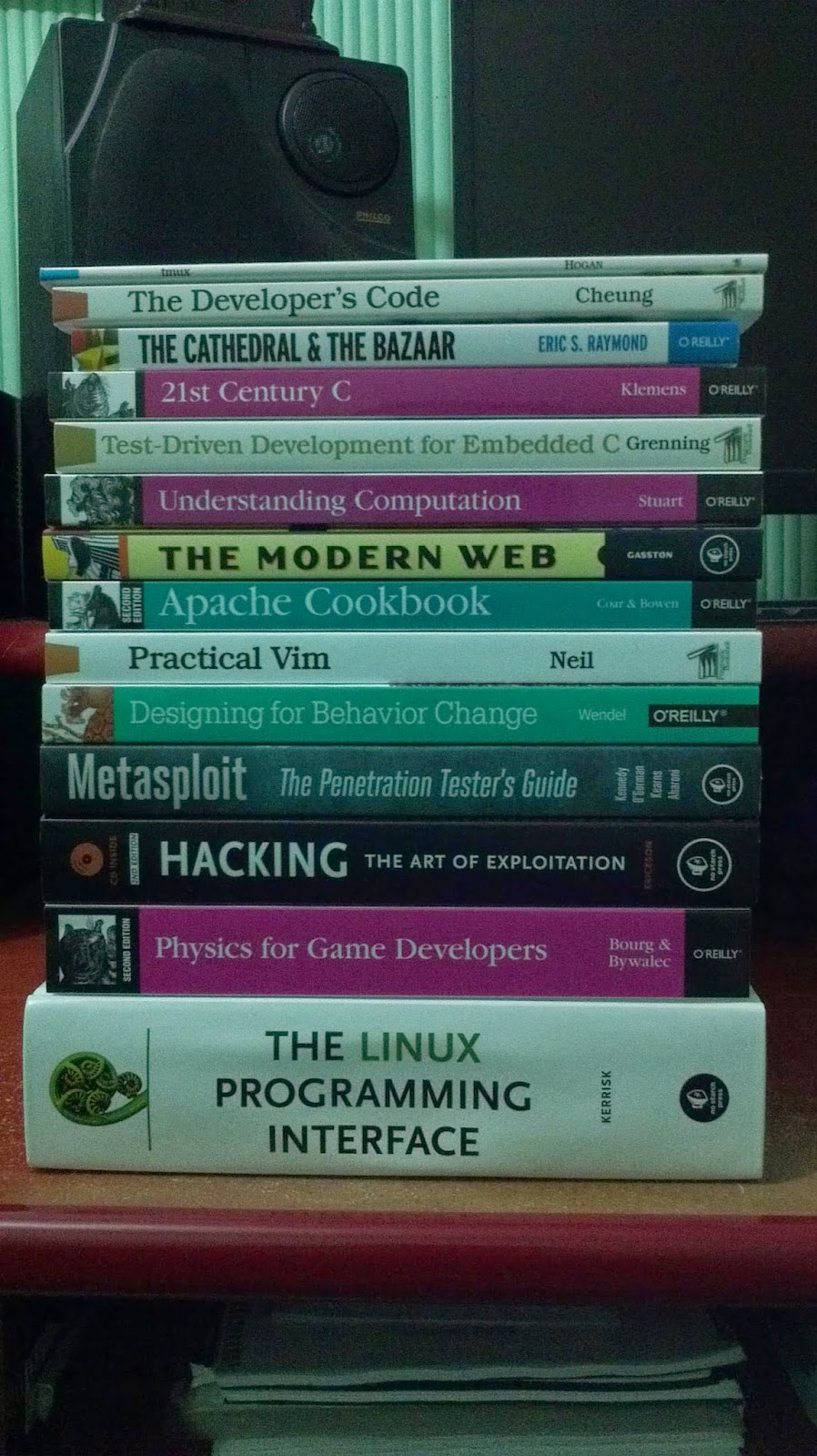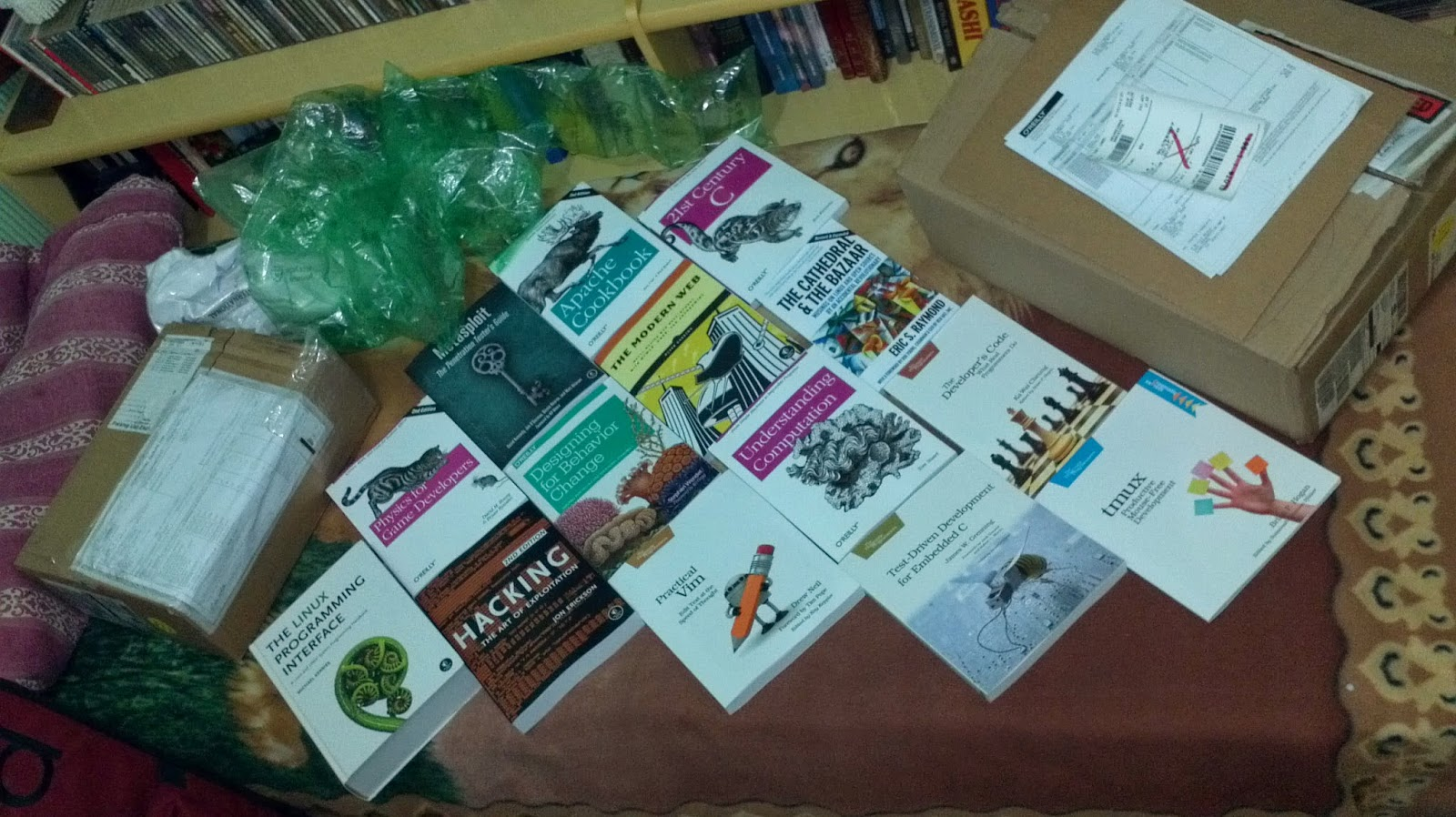2014 books
2015-01-20T16:42:00
I read a lot of books. Last year I had some money laying around and decided to put it to good use. I ended up buying fourteen books from O'Reilly (simply the best publisher in the technology field) on May and finally finished reading them all (exception bellow) on the first days of this year. This a quick and informal review of each of them.
As you'll notice, the scheduling algorithm used was an optimistic, little-endian, depth-first, heuristic search: I always grabbed the book which seemed the smallest from the pile of unread books and read it cover-to-back.

tmux: Productive Mouse-Free Development
This is a really thin book. I struggle to even call it a book. It is meant as a quick introduction to using tmux. I had been using it for a while and the book seemed interesting, so I gave it a shot. It certainly didn't let me down.
It delivers on its promise to give you the essentials to integrate this wonderful tool on your current workflow and it's certainly worth its price (which is as small as the book itself).
The Cathedral & the Bazaar
I don't think this book needs any introduction or even a review at all. If you've ever been in contact with any kind of free software (and you have), read it.
The Developer's Code
This is one of those books about programming that have very little code in it. I usually don't like them, but this one was certainly worth the read. An amusing look at software development as we all know it, from the perspective of a real developer.
I found it interesting that I had already developed many of the techniques presented on the tips, but did so in a very empirical way. It would certainly be nice to have read this book when I was starting my career.
21st Century C
Even though I don't work with it in my current daily job (and haven't worked with it for a long time), c is a language I am very interested in. First of all, we can all argue whether there is a god, but one thing is certain: if there is one and he created the universe, he wrote it in c. Aside from that, it is the basis to pretty much everything related to computers. It always amuses me to see people dog on c without realizing their favorite language's environment is most certainly written in c.
Anyway, this book is a must-read for anyone working with c that hasn't followed recent developments on the language and the tools around it. From the first steps to automating portable compilation with autotools, this book teaches what you need to learn (and specially the parts you should forget) about this venerable language.
Test Driven Development for Embedded C
This is one of the "weirdness-coefficient" books. I work with TDD, but in a language that is very far from c (python) in an area that is very far from embedded systems (web). I always wondered how, and even if, it could be applied to these types of environments, so I decided to get this book. To my surprise, it was one of the best texts I have read about TDD and software testing in general. Not to say the "embedded" part was overlooked. If you work with TDD and specially on embedded systems, I'd say this is an obligatory read.
Practical Vim
I will take two excerpts from Tim Pope's foreword as my review:
Practical Vim tips teach lessons in thinking like a proficient Vim user. In a sense, they are more like parables than recipes.
It is for this reason that I am excited about the publication of Practical Vim. Because now when Vim novices ask me what's the next step, I know what to tell them. After all, Practical Vim even taught me a few things.
Apache Cookbook
Not much to say here. This is a pretty good reference to anyone working with apache. Well worth the read.
The Modern Web
We all have to work on things we hate sometimes, and to me that is when I have to mess with the front-end of web development. But not liking it doesn't mean I can choose not to work with it.
Ranting aside, this is a great book to get up to speed with current and future areas of modern (front-end) web development. It covers everything you need to know about css3, html5 and new javascript API's.
Understanding Computation
This book's synopsis made me add it instantly to the shopping cart and I don't regret it. A great overview of the theoretical aspects of computation. If you liked studying Turing machines in college, this book is for you. Also, a great display of one of the most elegant pieces of code I have ever seen (specially in a book).
Designing for Behavior Change
This was a big surprise. I wanted a book on software architecture and this book's title was very inviting. I saw the five-star reviews and ordered it without even reading the introduction. If I did, I'd seen it is nothing even close to what I was expecting. It even explicitly states that there will be little to no code on the book.
This is a book about software design and (human) behavior analysis. It presents a psychological study on the characteristics of software that can aid in (human) behavior change. I would never buy this book consciously, but I have to say it was a pretty interesting read, if almost completely unrelated to what I work on.
Metasploit: The Penetration Tester's Guide
Software security is one of my favorite areas. This book was recommended by so many people, I had to buy it. It is a great overview of this penetration testing tool. Recommended.
Hacking: The Art of Exploitation
As I said in the previous review, I really like software security, but there were still many "magical" parts I didn't understand well enough. This book tackled them all and much more. I would go as far as to recommend it to anyone that uses a computer, as it explains in detail how a system actually works beneath all the abstractions we use in software development.
Physics for Game Developers
I always loved math and physics since school. In computers, these are mostly used on simulations and I never had the chance to work with anything related, except on some classes in college and on a computer graphics research project. Nevertheless, I play a lot with these things on my free time.
This book is a fun (if you, like me, think physics is fun) walk-through of the application of physics in computer simulations (and games, obviously). I really enjoyed it and would recommend it to anyone interested in the area.
The Linux Programming Interface
When I said I read all the books, I obviously lied. As Boromir would gladly tell you, one does not simply read The Linux Programming Interface. First of all, I can't just put in in my backpack and take it out on the bus to read. Someday I'll definitely read it, but for now it serves both as sporadic reference material and deeply intimidating table ornament.

So there you go. Now I'll be back to "normal" books for a while as my book pile has been growing steadily but surely these seven months. The first one on the list is Jane Austen's Pride and Prejudice. As for technical books, I still plan to finish Structure and Interpretation of Computer Programs, which I was very surprised to find in my college's library. I have been reading and practicing the exercises for almost a year (you can check it on github) and still haven't made it past section 2.3, but it is one of the most interesting programming books I have ever read.
After that, who knows. I may buy some more books. That depends a lot on my country's financial situation, which is nothing but a (downward) roller-coaster at the moment. To list some of the books I'm interested in: Pro Git's new edition, The Art of Memory Forensics (another O'Reilly book) and The Architecture of Open Source Applications.